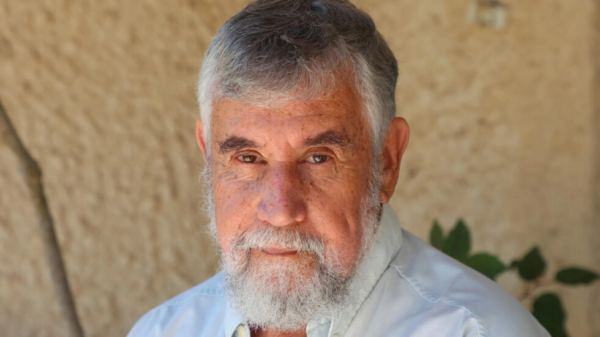Former Israeli Mossad agent turned author Mishka Ben-David is seen at his home © GIL COHEN-MAGEN / AFP
His writing anticipated a Hamas attack on Israeli kibbutzim and an Iranian strike from the skies, but former Mossad spy turned thriller author Mishka Ben-David is now concerned about what lies ahead.
Since the October 7 Hamas attack, one of 72-year-old Ben-David’s bestsellers has taken on an eerily prophetic tone.
Published in 2017, “The Shark” describes a deadly conflict that starts with a Hamas militant raid on kibbutzim near the Gaza border and culminates in a devastating Israeli attack on Iran in retaliation.
Last weekend, Iran launched hundreds of missiles and drones at Israel, which now appears to be preparing a response to this unprecedented attack.
The crisis is now “just a few steps” from the apocalyptic events envisioned in his book, Ben-David, the son of a Holocaust survivor, said calmly as he welcomed AFP to his home in the hills around Jerusalem.
Botched assassination bid
The dystopian opening pages of “The Shark” describe Hamas fighters breaking into the Kfar Aza kibbutz in southern Israel.
Seven years after the book’s publication, the kibbutz was among the hardest hit in the Palestinian militant group’s October 7 attack, with dozens killed.

Israeli military spokesman Rear Admiral Daniel Hagari (R) and his deputy Masha Michelson stand next to an Iranian ballistic missile which fell in Israel at the weekend © GIL COHEN-MAGEN / AFP
While researching for the book, the prolific author visited Israeli kibbutzim bordering Gaza, wondering: “Where would be the best place for Hamas to attack?”
“I thought it’s not protected for a scenario like this,” he said.
Ben-David, who served in Mossad for 12 years, is well placed to know that an army or intelligence agencies can fail.
In 1997, he was involved in Mossad’s infamous failed bid to assassinate Hamas’s then-political chief Khaled Meshaal in Jordan.
In July that year, a Hamas bombing in Jerusalem’s main market had killed 16 people and wounded more than 160.
Poison
At the time, Benjamin Netanyahu was serving his first term as prime minister, and it was decided to target Hamas leaders in response to the bombing.
A series of setbacks derailed the plan and Ben-David — then head of the intelligence department for Mossad’s operational unit — found himself in the unlikely position of having to save Meshaal’s life.

Ben-David is pictured among his books at home © GIL COHEN-MAGEN / AFP
Ben-David said the agents had proposed several ways to kill Meshaal, including putting a bomb in his car, having him shot by a sniper, or firing at him point blank.
But Netanyahu had wanted to “kill him silently” and without a trace, Ben-David said, surrounded by flowers in his garden.
The prime minister had been concerned “it would be clear that we did it and it would severely harm relations with Jordan”, Ben-David said.
So the agents settled on poison. They managed to spray it at their victim, but were caught after a sequence of unforeseen events, Ben-David said.
He said he kept the antidote with him in case an agent was accidentally contaminated, but it ended up being given to Meshaal after Jordan negotiated an exchange for the release of the two Israeli agents.
‘Not here forever’
Ben-David left Mossad in 1999 after his identity was exposed following the failed attempt on Meshaal’s life.
He has written about 20 books in Hebrew that span several genres, and some have been translated into other languages.
Looking back, as Israel tracks Hamas leader Yahya Sinwar, the man it says masterminded the October 7 attack, Ben-David has his doubts about how effective assassinations are.
There’s always a deputy who can step up, he said.
And with the region in turmoil, his thoughts have turned to his country’s future.
“The people of Israel have lived 3,000 years already, maybe more,” said the father of three.
“But you look at the Roman Empire, you look at Genghis Khan… they all disappear sooner or later,” he said.
“My perspective tells me that Israel will not be here forever.”
Mongol raids into Palestine took place towards the end of the Crusades, following the temporarily successful Mongol invasions of Syria, primarily in 1260 and 1300.
In 63 BC, the Romans took Palestine as a Roman province. The Jews revolted against the Romans in 66 AD. The rebellion was crushed and the Second Temple was destroyed in 70 AD. In 135 AD the Jewish population of Palestine was dispersed throughout the ancient world.
AFP/ Frrance 24/ Ya Libnan


Leave a Reply
You must be logged in to post a comment.